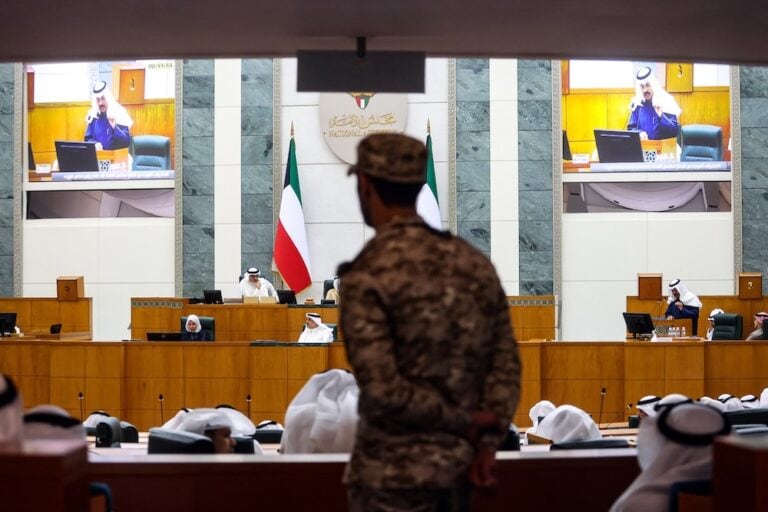“Kuwait’s highest court could have created a remedy for a slew of prosecutions that violate constitutional guarantees of free speech,” said Joe Stork, deputy Middle East and North Africa director at Human Rights Watch. “The court squandered that opportunity.”
Kuwait’s Constitutional Court dealt a blow to free speech on December 2, 2013 in a case involving a journalist’s Twitter comments, Human Rights Watch said today. The court rejected a challenge to article 25 of the penal code, which sets prison sentences of up to five years for anyone who publicly “objects to the rights and authorities of the emir or faults him.”
Officials had on November 20, 2012 charged Ayyad Khaled al-Harbi, a journalist for Sabr, a Kuwait-based independent website that publishes news and commentary, with violating article 25 in comments critical of the emir on Twitter. His lawyer challenged the charge, contending that article 25 violates the provision for freedom of speech in the Kuwaiti constitution, and the case reached the country’s highest court.
“Kuwait’s highest court could have created a remedy for a slew of prosecutions that violate constitutional guarantees of free speech,” said Joe Stork, deputy Middle East and North Africa director at Human Rights Watch. “The court squandered that opportunity.”
Al-Harbi’s lawyer, Khaled Felah al-Kafifa told Human Rights Watch that at the hearing of the second circuit of the criminal court on December 24, 2012, he argued that article 25 violates several provisions of the Kuwaiti constitution, including most notably article 36, which guarantees freedom of opinion and expression. He also argued that the definition of the crime of “offending the emir” in article 25 is too vague, and could include a broad range of actions from gentle criticism to a coup attempt.
That court sentenced Al-Harbi to two years in prison on January 7. He continued to appeal until the case reached the Constitutional Court. The verdicts of this court are final.
In Kuwait’s constitution, the emir, currently Sheikh Sabah al-Ahmad al-Sabah, is described as “immune and inviolable.” The Constitutional Court stated in its written verdict: “It is not acceptable that the highest position in the country should be treated like other individuals.” The court added that failure to protect the ruler could threaten the country’s unity, its internal security, and the government itself.
Since a political crisis in June 2012, Kuwaiti authorities have ramped up efforts to limit free expression, charging dozens of politicians, online activists, and journalists with “offending” Kuwait’s head of state, other regional leaders, and the Prophet Muhammad, among other charges. Prosecutors have relied on vaguely worded provisions in the penal code, including article 25, and article 111, which sets a sentence of up to one year in prison for anyone who “mocks God, the prophets and messengers, or the honor of his messengers and their wives.”
As a state party to the International Covenant on Civil and Political Rights and the Arab Charter on Human Rights, Kuwait is required to protect the rights to freedom of opinion and expression. The United Nations Human Rights Committee, which provides the definitive interpretation of the covenant, has stated that “all public figures, including those exercising the highest political authority such as heads of state and government, are legitimately subject to criticism and political opposition,” and that there is a need for “uninhibited expression” in public debate concerning public figures. It also says that “prohibitions of displays of lack of respect for a religion or other belief system, including blasphemy laws, are incompatible with the Covenant,” except in very limited circumstances.
The authorities should drop charges against those accused or convicted of crimes solely for exercising their right to express critical views on any subject, no matter how sensitive, and parliament should revoke articles 25 and 111 of the penal code, Human Rights Watch said.


